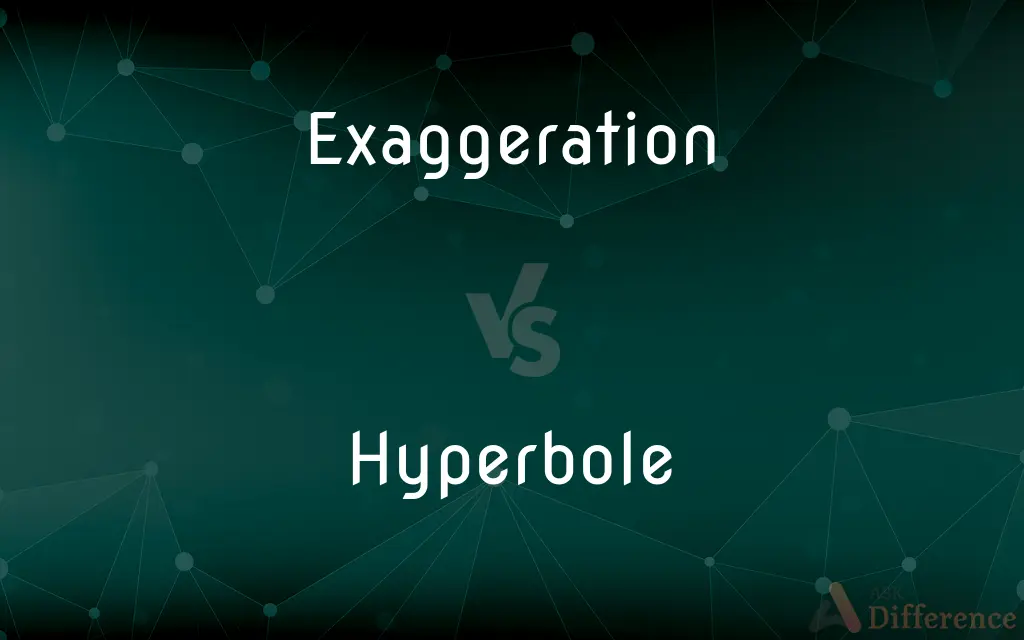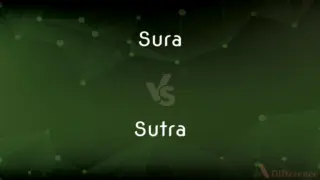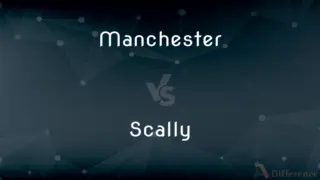Exaggeration vs. Hyperbole — What's the Difference?
Edited by Tayyaba Rehman — By Fiza Rafique — Updated on September 28, 2023
Exaggeration involves overstating or magnifying the truth, often for emphasis. Hyperbole is a specific form of exaggeration, using extreme exaggeration for dramatic effect or emphasis.

Difference Between Exaggeration and Hyperbole
Table of Contents
ADVERTISEMENT
Key Differences
Exaggeration is a rhetorical device used to amplify, overstate, or magnify something beyond its actual or true scale or degree. It is often employed for various purposes, such as humor, emphasis, or to make a point. Hyperbole is a specific type of exaggeration characterized by the use of extreme and extravagant language to create emphasis, evoke strong emotions, or make a point.
For example, saying "I'm so hungry I could eat a horse" is an exaggeration to emphasize extreme hunger. For instance, saying "I've told you a million times" when you've repeated something frequently is a hyperbolic statement.
In summary, exaggeration is a broader term encompassing any instance of overstating facts, while hyperbole is a particular form of exaggeration using extreme language for dramatic effect.
Comparison Chart
Definition
Overstatement or magnification beyond truth
Extreme exaggeration for emphasis
Purpose
Used for humor, emphasis, or making a point
Creates dramatic or emotional impact
ADVERTISEMENT
Example
"I'm starving" when mildly hungry
"I could sleep for a century" to express exhaustion
Literary Device
A rhetorical device
A specific type of exaggeration
Everyday Language
Common in everyday conversation
Frequently used to add flair
Compare with Definitions
Exaggeration
It is used to emphasize a point, often by making it more extreme than it is.
Her bag weighed a ton.
Hyperbole
Hyperbole is a form of exaggeration using extreme language.
I'm so hungry I could eat a whole cow.
Exaggeration
Exaggeration can be used humorously, such as saying, "I laughed so hard I cried rivers."
Hyperbole
It adds flair to statements to create emphasis.
I'll be there in a million years.
Exaggeration
It captures attention by making statements more striking.
The party was so loud you could hear it from space.
Hyperbole
Hyperbole is a creative literary device often used in poetry and storytelling.
The suitcase was heavier than a mountain.
Exaggeration
Exaggeration is the act of overstating or magnifying something for effect.
The fish I caught was as big as a whale.
Hyperbole
Hyperbole uses extravagant expressions to make a point.
My backpack weighs a ton.
Exaggeration
Exaggeration is the representation of something as more extreme or dramatic than it really is. Exaggeration may occur intentionally or unintentionally.
Hyperbole
It is employed for dramatic and emotional impact in language.
I've been waiting for ages.
Exaggeration
To consider, represent, or cause to appear as larger, more important, or more extreme than is actually the case; overstate
Exaggerated his own role in the episode.
Exaggerated the size of the enemy force.
Exaggerated how difficult the project would be.
Hyperbole
Hyperbole (, listen) (adjective form hyperbolic, listen) is the use of exaggeration as a rhetorical device or figure of speech. In rhetoric, it is also sometimes known as auxesis (literally 'growth').
Exaggeration
To make overstatements.
Hyperbole
Exaggerated statements or claims not meant to be taken literally
He vowed revenge with oaths and hyperboles
You can't accuse us of hyperbole
Exaggeration
The act of heaping or piling up.
Hyperbole
A figure of speech in which exaggeration is used for emphasis or effect, as in I could sleep for a year or This book weighs a ton.
Exaggeration
The act of exaggerating; the act of doing or representing in an excessive manner; a going beyond the bounds of truth, reason, or justice; a hyperbolical representation; hyperbole; overstatement.
They say he's a millionnaire, but that's a massive exaggeration.
Hyperbole
Deliberate or unintentional overstatement, particularly extreme overstatement.
Exaggeration
A representation of things beyond natural life, in expression, beauty, power, vigor.
Hyperbole
(countable) An instance or example of such overstatement.
Exaggeration
The act of heaping or piling up.
Hyperbole
A hyperbola.
Exaggeration
The act of exaggerating; the act of doing or representing in an excessive manner; a going beyond the bounds of truth reason, or justice; a hyperbolical representation; hyperbole; overstatement.
No need of an exaggeration of what they saw.
Hyperbole
A figure of speech in which the expression is an evident exaggeration of the meaning intended to be conveyed, or by which things are represented as much greater or less, better or worse, than they really are; a statement exaggerated fancifully, through excitement, or for effect.
Our common forms of compliment are almost all of them extravagant hyperboles.
Somebody has said of the boldest figure in rhetoric, the hyperbole, that it lies without deceiving.
Exaggeration
A representation of things beyond natural life, in expression, beauty, power, vigor.
Hyperbole
Extravagant exaggeration
Exaggeration
Extravagant exaggeration
Exaggeration
The act of making something more noticeable than usual;
The dance involved a deliberate exaggeration of his awkwardness
Exaggeration
Making to seem more important than it really is
Exaggeration
Exaggeration is a common feature of everyday language.
I've got a million things to do.
Common Curiosities
How is exaggeration used in everyday language?
It is commonly used in expressions like "I'm starving" when mildly hungry or "It's the biggest thing ever" for emphasis.
What is the purpose of exaggeration in communication?
Exaggeration is employed to capture attention, emphasize points, and make statements more striking.
Give an example of a famous exaggeration.
"I have a million things to do" is a famous exaggeration used to describe a busy schedule.
Can exaggeration be humorous?
Yes, exaggeration is frequently used for humor, adding comedic effect to statements.
What is exaggeration?
Exaggeration is the act of overstating or magnifying something, often for emphasis, humor, or making a point.
How is hyperbole different from regular exaggeration?
Hyperbole involves extreme exaggeration, creating a more pronounced and dramatic effect than regular exaggeration.
What is hyperbole?
Hyperbole is a specific form of exaggeration that uses extreme and extravagant language for dramatic or emotional impact.
In what contexts is hyperbole commonly used?
Hyperbole is often used in everyday language to add flair to expressions, create emphasis, or evoke strong emotions.
Give an example of a well-known hyperbolic statement.
"I could sleep for a century" is a well-known hyperbolic expression used to convey extreme exhaustion.
Is hyperbole limited to spoken language, or is it used in literature as well?
Hyperbole is a creative literary device used in poetry, storytelling, and various forms of literature to create vivid and exaggerated imagery.
Share Your Discovery

Previous Comparison
Sura vs. Sutra
Next Comparison
Manchester vs. ScallyAuthor Spotlight
Written by
Fiza RafiqueFiza Rafique is a skilled content writer at AskDifference.com, where she meticulously refines and enhances written pieces. Drawing from her vast editorial expertise, Fiza ensures clarity, accuracy, and precision in every article. Passionate about language, she continually seeks to elevate the quality of content for readers worldwide.
Edited by
Tayyaba RehmanTayyaba Rehman is a distinguished writer, currently serving as a primary contributor to askdifference.com. As a researcher in semantics and etymology, Tayyaba's passion for the complexity of languages and their distinctions has found a perfect home on the platform. Tayyaba delves into the intricacies of language, distinguishing between commonly confused words and phrases, thereby providing clarity for readers worldwide.














































